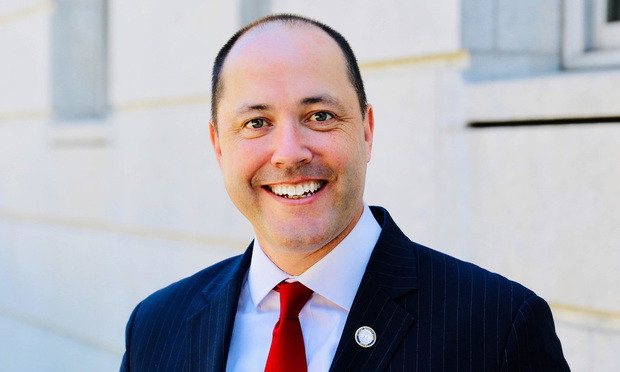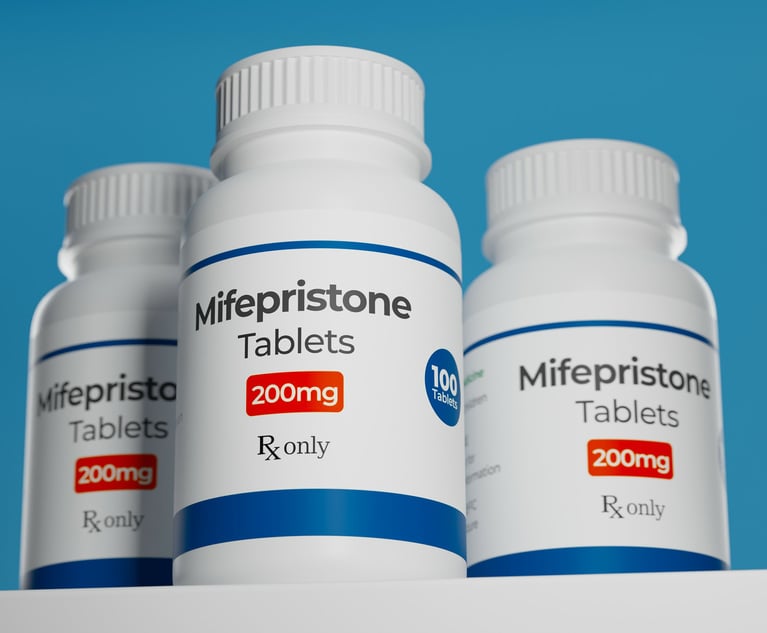Carr: Georgia In on $10B Purdue Pharma Deal, but Opioid Litigation Continues
"This move by Purdue Pharma was not unexpected, and we have joined a number of states in preparing accordingly," Georgia Attorney General Chris Carr said. "Our focus from the beginning has been to hold those accountable for their role in fueling the opioid crisis and to quickly and efficiently get resources into the hands of those who are struggling."
September 18, 2019 at 04:25 PM
5 minute read
 Chris Carr, Georgia attorney general (Courtesy photo)
Chris Carr, Georgia attorney general (Courtesy photo)
While Georgia has agreed to the planned $10 billion settlement with OxyContin maker Purdue Pharma, the state's opioid litigation against a string of other drug companies and distributors will continue in the Gwinnett County business court, Attorney General Chris Carr has said.
Carr also said Purdue's bankruptcy won't affect the state's ability to recover.
Purdue announced both the settlement and the bankruptcy Sunday, saying the structure will provide more than $10 billion of company value to state and local governments that have filed litigation, as well as to individuals affected by the opioid addiction epidemic.
"This unique framework for a comprehensive resolution will dedicate all of the assets and resources of Purdue for the benefit of the American public," Purdue's board of directors chairman Steve Miller said in announcing the news Sunday. "This settlement framework avoids wasting hundreds of millions of dollars and years on protracted litigation, and instead will provide billions of dollars and critical resources to communities across the country trying to cope with the opioid crisis. We will continue to work with state attorneys general and other plaintiff representatives to finalize and implement this agreement as quickly as possible."
Carr released statements Monday evening and Tuesday afternoon in answer to reporters' inquiries, confirming that Georgia was among the 24 states in the deal with Purdue. Carr's statements backed up the Purdue chairman.
"This move by Purdue Pharma was not unexpected, and we have joined a number of states in preparing accordingly," Carr said. "Our focus from the beginning has been to hold those accountable for their role in fueling the opioid crisis and to quickly and efficiently get resources into the hands of those who are struggling. Along with a majority of state attorneys general and localities pursuing litigation against Purdue Pharma and the Sackler family, we have agreed to a proposed framework that we believe holds them accountable while securing for Georgians the best possible chance to get the help they deserve."
Carr agreed with Purdue that the settlement deal, if approved by the bankruptcy court, could provide a total of $10 billion. "Conversely, there is no guarantee of what could be recovered in a 'free fall' Chapter 11 bankruptcy," Carr said.
Litigation against many other defendants remains pending, Carr added.
"It is important to note, these efforts to hold accountable Purdue Pharma and the Sackler Family for their role in fueling the opioid epidemic are extremely important, but we continue to also work to hold other manufacturers, as well as distributors, accountable," Carr said. "Our office will continue to pursue our Georgia-specific litigation in the Business Case Division of the Gwinnett County Superior Court—even if Purdue gets dropped."
Carr hired outside counsel last year to handle opioid litigation. They filed a January lawsuit in Gwinnett County Superior Court against a long list of drugmakers, alleging that they fueled the opioid addiction crisis for profit with false advertising that understated the dangers and exaggerated the benefits of their products.
The complaint accused drugmakers of paying "front groups" and "key opinion leaders" to promote pills while deceptively appearing to be unbiased. The complaint alleged the drugmakers flooded the market with pills without providing the required monitoring, paving the way for improper use. And the complaint accused the companies of unleashing a deluge of opioids into Georgia, then failing to prevent the diversion of the drugs away from legitimate medical providers and pharmacies and into the black market.
The team Carr hired last September includes a powerhouse plaintiffs firm from Alabama and some well-known litigators in Georgia, to investigate and file lawsuits against makers and sellers of opioid drugs. Those firms are working on a contingency-fee arrangement. John Bevis of the Barnes Law Group in Marietta is a special assistant attorney general for opioid litigation. The Barnes Law Group is working with the Cooper Firm in Marietta, Franklin Law in Savannah, and Beasley, Allen, Crow, Methvin, Portis & Miles in Montgomery and Atlanta.
Carr said when the suit was filed: "We are bringing this lawsuit quite simply to seek justice for the citizens of Georgia. It is imperative that we recover for the widespread damage that has been caused by this epidemic."
Carr said in announcing the legal team last year that he would dedicate "every available resource our office has to fight the opioid epidemic—whether by increasing communication and coordination through our Statewide Opioid Task Force, cracking down on illegal prescribing through our Medicaid Fraud Control Unit or conducting training opportunities for law enforcement and prosecutors through our national partnerships."
This content has been archived. It is available through our partners, LexisNexis® and Bloomberg Law.
To view this content, please continue to their sites.
Not a Lexis Subscriber?
Subscribe Now
Not a Bloomberg Law Subscriber?
Subscribe Now
NOT FOR REPRINT
© 2025 ALM Global, LLC, All Rights Reserved. Request academic re-use from www.copyright.com. All other uses, submit a request to [email protected]. For more information visit Asset & Logo Licensing.
You Might Like
View All
Drugmaker Wins $70.5M After Fed Judge Says Generic Sales Were Blocked
4 minute read
5-Year Litigation Against Metro Atlanta Pharmacy Headed for Trial After Interlocutory Appeal Denied

Opioid Defendant Motions to Disqualify Motley Rice Over Alleged Ethical Concerns
5 minute read
Abortion Rights Set to Return to Supreme Court With Mifepristone Case
Trending Stories
- 1How the Court of Public Opinion Should Factor Into Litigation Strategy
- 2Debevoise Lures Another SDNY Alum, Adding Criminal Division Chief
- 3Cooley Promotes NY Office Leader to Global Litigation Department Chair
- 4What Happens When Lateral Partners’ Guaranteed Compensation Ends?
- 5Tuesday Newspaper
Who Got The Work
J. Brugh Lower of Gibbons has entered an appearance for industrial equipment supplier Devco Corporation in a pending trademark infringement lawsuit. The suit, accusing the defendant of selling knock-off Graco products, was filed Dec. 18 in New Jersey District Court by Rivkin Radler on behalf of Graco Inc. and Graco Minnesota. The case, assigned to U.S. District Judge Zahid N. Quraishi, is 3:24-cv-11294, Graco Inc. et al v. Devco Corporation.
Who Got The Work
Rebecca Maller-Stein and Kent A. Yalowitz of Arnold & Porter Kaye Scholer have entered their appearances for Hanaco Venture Capital and its executives, Lior Prosor and David Frankel, in a pending securities lawsuit. The action, filed on Dec. 24 in New York Southern District Court by Zell, Aron & Co. on behalf of Goldeneye Advisors, accuses the defendants of negligently and fraudulently managing the plaintiff's $1 million investment. The case, assigned to U.S. District Judge Vernon S. Broderick, is 1:24-cv-09918, Goldeneye Advisors, LLC v. Hanaco Venture Capital, Ltd. et al.
Who Got The Work
Attorneys from A&O Shearman has stepped in as defense counsel for Toronto-Dominion Bank and other defendants in a pending securities class action. The suit, filed Dec. 11 in New York Southern District Court by Bleichmar Fonti & Auld, accuses the defendants of concealing the bank's 'pervasive' deficiencies in regards to its compliance with the Bank Secrecy Act and the quality of its anti-money laundering controls. The case, assigned to U.S. District Judge Arun Subramanian, is 1:24-cv-09445, Gonzalez v. The Toronto-Dominion Bank et al.
Who Got The Work
Crown Castle International, a Pennsylvania company providing shared communications infrastructure, has turned to Luke D. Wolf of Gordon Rees Scully Mansukhani to fend off a pending breach-of-contract lawsuit. The court action, filed Nov. 25 in Michigan Eastern District Court by Hooper Hathaway PC on behalf of The Town Residences LLC, accuses Crown Castle of failing to transfer approximately $30,000 in utility payments from T-Mobile in breach of a roof-top lease and assignment agreement. The case, assigned to U.S. District Judge Susan K. Declercq, is 2:24-cv-13131, The Town Residences LLC v. T-Mobile US, Inc. et al.
Who Got The Work
Wilfred P. Coronato and Daniel M. Schwartz of McCarter & English have stepped in as defense counsel to Electrolux Home Products Inc. in a pending product liability lawsuit. The court action, filed Nov. 26 in New York Eastern District Court by Poulos Lopiccolo PC and Nagel Rice LLP on behalf of David Stern, alleges that the defendant's refrigerators’ drawers and shelving repeatedly break and fall apart within months after purchase. The case, assigned to U.S. District Judge Joan M. Azrack, is 2:24-cv-08204, Stern v. Electrolux Home Products, Inc.
Featured Firms
Law Offices of Gary Martin Hays & Associates, P.C.
(470) 294-1674
Law Offices of Mark E. Salomone
(857) 444-6468
Smith & Hassler
(713) 739-1250






